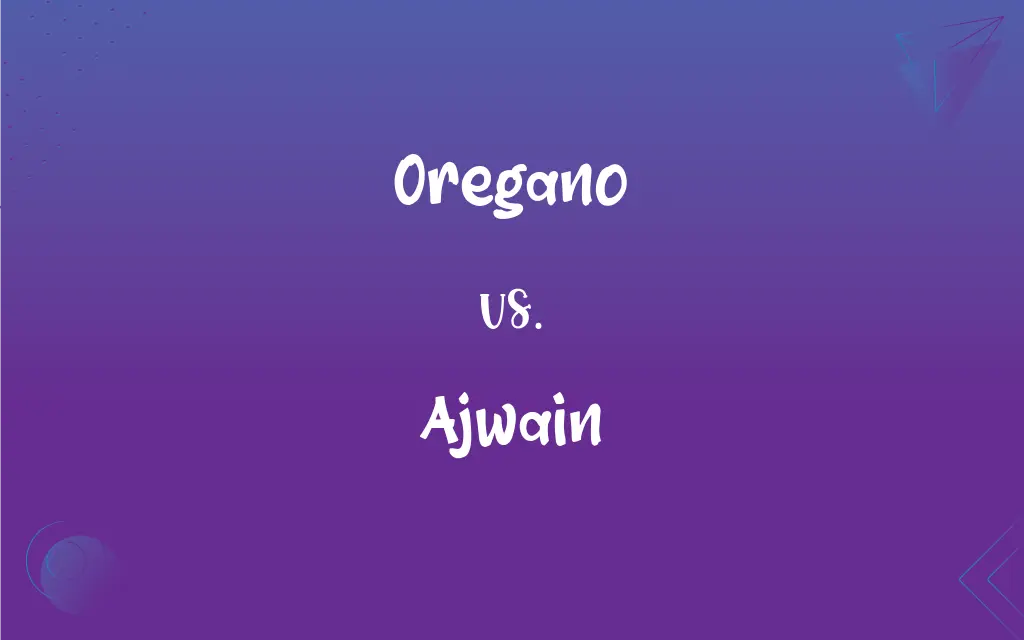Oregano vs. Ajwain: What's the Difference?
Edited by Aimie Carlson || By Janet White || Updated on October 5, 2023
Oregano is a herb often used in Italian cuisine, known for its bold, earthy flavor, while Ajwain, with a taste similar to thyme, is a spice in Indian cooking, known for its digestive benefits.

Key Differences
Oregano and Ajwain, while both used in culinary applications, hail from different cultures and culinary traditions. Oregano is a popular herb in Mediterranean and Mexican cuisines, known for its robust, earthy flavor with a hint of sweetness. It is widely used in Italian dishes like pizza and pasta, imparting a distinctive taste and aroma. The herb is rich in antioxidants and anti-inflammatory compounds, and it's available fresh or dried.
Ajwain, on the other hand, is a spice predominantly used in Indian cuisine. Also known as carom seeds, Ajwain has a slightly bitter, pungent flavor, with a taste resembling thyme or anise. It is renowned for its digestive properties in Ayurvedic medicine, and it's often used to flavor bread, rice, and various Indian dishes. The spice is known to possess several medicinal properties including, antibacterial, antifungal, and anti-inflammatory attributes.
The cultural contexts of Oregano and Ajwain speak to their varying culinary utilizations. While Oregano is a staple in Western cooking, specifically within Italian, Greek, and Mexican dishes, Ajwain is a fundamental ingredient in Indian cooking, often used in tadka (tempering) or added to doughs. These herbs have distinct flavors; Oregano tends to have a bold, peppery flavor with a hint of sweetness, whereas Ajwain is more aromatic and pungent.
Both Oregano and Ajwain have found places in traditional medicine within their respective cultures, touted for their potential health benefits. Oregano is known for its antioxidant-rich content, potentially aiding in reducing inflammation and combating bacterial infections. In contrast, Ajwain is praised for its potential digestive benefits, offering relief from indigestion and acidity, and it’s used in traditional remedies for respiratory disorders.
While Oregano and Ajwain may serve as flavoring agents within their culinary realms, their distinctive taste profiles and usage in cooking illustrate the rich diversity in culinary traditions across the world. They exemplify how different cultures utilize various herbs and spices to create distinctive, flavorful dishes, contributing to the global culinary tapestry.
ADVERTISEMENT
Comparison Chart
Origin
Mediterranean and Mexican cuisines.
Indian cuisine.
Flavor Profile
Bold, earthy, with a hint of sweetness.
Bitter, pungent, resembling thyme or anise.
Usage in Cooking
Used in pizzas, pastas, and various other dishes.
Used in bread, rice, and various Indian dishes.
Medicinal Benefits
Antioxidant and anti-inflammatory properties.
Digestive benefits, antibacterial, and anti-inflammatory properties.
Availability
Available fresh or dried.
Typically available as seeds.
ADVERTISEMENT
Oregano and Ajwain Definitions
Oregano
A herb rich in antioxidants and anti-inflammatory compounds.
Oregano oil is often used for its potential health benefits.
Ajwain
An aromatic spice with antibacterial and anti-inflammatory properties.
Ajwain is often used in traditional remedies for respiratory disorders.
Oregano
A perennial herb with flavorful leaves, used as a seasoning.
Oregano is a crucial ingredient in Italian marinara sauce.
Ajwain
Seeds of the Ajwain plant, resembling parsley seeds, with a flavor similar to thyme.
Ajwain seeds add a distinctive flavor to Indian bread.
Oregano
A culinary herb with a bold, earthy flavor, used in Mediterranean and Mexican cuisines.
The chef sprinkled oregano over the pizza for an added burst of flavor.
Ajwain
A spice with a pungent taste, used predominantly in Indian cuisine.
Ajwain seeds are used in tadka to flavor lentils.
Oregano
A seasoning derived from the leaves of the oregano plant, available fresh or dried.
Dried oregano is a staple in many spice racks.
Ajwain
A spice known for its digestive properties in Ayurvedic medicine.
Consuming ajwain can help alleviate indigestion.
Oregano
A plant of the mint family, used for its aromatic leaves.
The scent of oregano filled the kitchen as the sauce simmered.
Ajwain
A culinary ingredient in Indian cooking, often added to doughs or used in tempering.
The dough for the puri is flavored with ajwain seeds.
Oregano
A perennial Eurasian herb (Origanum vulgare) in the mint family, having aromatic leaves. Also called wild marjoram.
Ajwain
A plant in the family Apiaceae (Trachyspermum ammi), and its seed-like fruit, which is used (especially in South Asian cooking) for its thyme-like flavor.
Oregano
The leaves of this plant used as a seasoning.
Oregano
A herb of the mint family, Origanum vulgare, having aromatic leaves.
Oregano
Other herbs with a similar flavor, including other species in the genus Origanum, and Mexican oregano, Lippia graveolens
Oregano
The leaves of these plants used in flavouring food.
Oregano
Aromatic Eurasian perennial
Oregano
Pungent leaves used as seasoning with meats and fowl and in stews and soups and omelets
FAQs
Does oregano have health benefits?
Yes, oregano is rich in antioxidants and has anti-inflammatory properties.
Is ajwain helpful for digestion?
Yes, ajwain is renowned for its digestive properties in Ayurvedic medicine.
Can ajwain be used in Indian bread?
Yes, ajwain is often added to the dough of various Indian bread.
Is oregano available worldwide?
Yes, oregano is widely available in both fresh and dried forms.
Does ajwain have a distinct aroma?
Yes, ajwain has a strong, distinctive aroma.
Is oregano used in Italian cooking?
Yes, oregano is a fundamental herb in Italian cuisine.
Is ajwain pungent in flavor?
Yes, ajwain has a slightly bitter, pungent flavor.
Can oregano be used fresh or dried?
Yes, oregano can be used both fresh and dried in cooking.
Can ajwain alleviate respiratory disorders?
Yes, ajwain is used in remedies for respiratory disorders.
Is ajwain used in traditional medicine?
Yes, ajwain is used in traditional remedies for various ailments.
Can oregano be used in Mexican cuisine?
Yes, oregano is also a popular herb in Mexican cuisine.
Can oregano be used in sauces?
Yes, oregano is often used to flavor sauces.
Is ajwain an aromatic spice?
Yes, ajwain is considered an aromatic spice.
Does oregano belong to the mint family?
Yes, oregano is a plant of the mint family.
Is oregano a perennial herb?
Yes, oregano is a perennial herb.
About Author
Written by
Janet WhiteJanet White has been an esteemed writer and blogger for Difference Wiki. Holding a Master's degree in Science and Medical Journalism from the prestigious Boston University, she has consistently demonstrated her expertise and passion for her field. When she's not immersed in her work, Janet relishes her time exercising, delving into a good book, and cherishing moments with friends and family.
Edited by
Aimie CarlsonAimie Carlson, holding a master's degree in English literature, is a fervent English language enthusiast. She lends her writing talents to Difference Wiki, a prominent website that specializes in comparisons, offering readers insightful analyses that both captivate and inform.































































